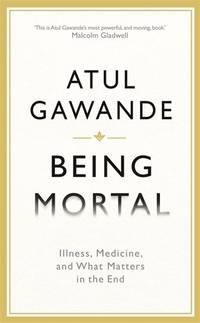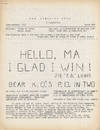

BEING MORTAL: Illness, Medicine and What Matters in the End (Wellcome Collection)
by Gawande, Atul
- Used
- Fine
- Hardcover
- first
- Condition
- Fine/Fine
- ISBN 10
- 1846685818
- ISBN 13
- 9781846685811
- Seller
-
Los Angeles, California, United States
Payment Methods Accepted
About This Item
Synopsis
ATUL GAWANDE is a surgeon, writer, and public health researcher. He practices general and endocrine surgery at Brigham and Women's Hospital in Boston. He is also Professor of Surgery at Harvard Medical School and Professor in the Department of Health Policy and Management at the Harvard School of Public Health. He has been a staff writer for The New Yorker magazine since 1998. He has written three New York Times bestselling books: Complications which was a finalist for the National Book Award in 2002; Better ; and The Checklist Manifesto He has won two National Magazine Awards, AcademyHealth's Impact Award for highest research impact on health care, a MacArthur Award, and selection by Foreign Policy Magazine and Time magazine as one of the world's top 100 influential thinkers.
Reviews
Being Mortal is the fourth book by American surgeon and author, Atul Gawande. Early on in his book, he tells us :"…the purpose of medical schooling was to teach how to save lives, not how to tend to their demise" and that "I knew theoretically that my patients could die, of course, but every actual instance seemed like a violation, as if the rules I thought we were playing by were broken. I don't know what game I thought this was, but in it we always won".
But don't get the wrong idea: this is not a book about dying, so much, as a book that looks at how the latter hours, days, weeks, months or even years of life can be improved. As we get older, and usually frailer (because there is no "…automatic defrailer…" [p44] available to us), we need to rethink where the emphasis should lie: "…our most cruel failure in how we treat the sick and the aged is the failure to recognise that they have priorities beyond merely being safe and living longer…"
"We end up with institutions that address any number of societal goals – from freeing up hospital beds to taking burdens off families' hands to coping with poverty among the elderly – but never the goal that matters to the people who reside in them: how to make life worth living when we're weak and frail and can't fend for ourselves". Gawande's wife's grandmother, when institutionalised, remarked: "She felt incarcerated, like she was in prison for being old"
Gawande backs up his ideas with plenty of data that is both fascinating and revealing. And while an information dump could be boring, he illustrates all this with the results of studies and anecdotes about real people. It doesn't get much more personal than the experience of his own father's decline.
"Our responsibility, in medicine, is to deal with human beings as they are. People die only once. They have no experience to draw on. They need doctors and nurses who are willing to have the hard discussions and say what they have seen, who will help people prepare for what is to come…"
While many practitioners of palliative care will be familiar with what Gawande says, this book should be compulsory reading for most health care professionals. Oncologists, gerontologists, surgeons and intensivists (and their patients!) in particular would benefit from reading this book from cover to cover; those of us with ageing or debilitated family members, or those wanting to plan for their own eventual decline, would also find this book interesting and useful.
He concludes: "We've been wrong about what our job is in medicine. We think our job is to ensure health and survival. But really it is larger than that. It is to enable well-being. And well-being is about the reasons one wishes to be alive. Those reasons matter not just at the end of life, or when debility comes, but all along the way. Whenever serious sickness or injury strikes and your body or mind breaks down, the vital questions are the same: What is your understanding of the situation and its potential outcomes? What are your fears and what are your hopes? What are the trade-offs you are willing to make and not willing to make? And what is the course of action that best serves this understanding?" Recommended.
(Log in or Create an Account first!)
Details
- Bookseller
- Joe Staats, Bookseller
(US)
- Bookseller's Inventory #
- 024846
- Title
- BEING MORTAL: Illness, Medicine and What Matters in the End (Wellcome Collection)
- Author
- Gawande, Atul
- Format/Binding
- Hardcover
- Book Condition
- Used - Fine
- Jacket Condition
- Fine
- Quantity Available
- 1
- Edition
- 1st Edition 1st Printing
- ISBN 10
- 1846685818
- ISBN 13
- 9781846685811
- Publisher
- Wellcome Collection
- Place of Publication
- New York, New York, U.S.A.
- Date Published
- 2014
- Pages
- 288
- Size
- 8vo - over 7¾ - 9¾
Terms of Sale
Joe Staats, Bookseller
About the Seller
Joe Staats, Bookseller
About Joe Staats, Bookseller
We specialize in collectible, contemporary signed first editions. First edition means the first printing. (Later printings of the first edition are typically not printed on acid-free paper, and should be avoided by collectors.) Signatures are obtained by us in person. Inscribed books sold by us may contain a line, a phrase, or a sketch that the author has chosen to add. Our signed books are not dedicated to anybody in particular (not to your grandmother, your Aunt Gladys, your ex-lover or your former cellmate), except in the rare case of a presentation copy from an author to a noteworthy person. All our books are hardcover, unless the book is an Advance Reading Copy, Uncorrected Proof, or PBO. You can expect that the books we send you will be as described, and in a physical condition worthy of the author’s having signed them. We do not sell remainder-marked books, signed or otherwise
Glossary
Some terminology that may be used in this description includes:
- Fine
- A book in fine condition exhibits no flaws. A fine condition book closely approaches As New condition, but may lack the...
- First Edition
- In book collecting, the first edition is the earliest published form of a book. A book may have more than one first edition in...
- Jacket
- Sometimes used as another term for dust jacket, a protective and often decorative wrapper, usually made of paper which wraps...

